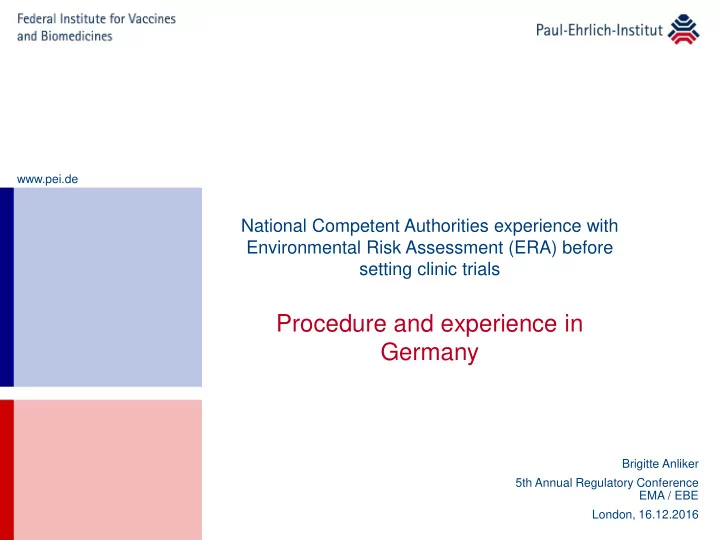

www.pei.de National Competent Authorities experience with Environmental Risk Assessment (ERA) before setting clinic trials Procedure and experience in Germany Brigitte Anliker 5th Annual Regulatory Conference EMA / EBE London, 16.12.2016
Agenda Legal basis: GMO legislation Pharmaceutical legislation Procedure in Germany Simplified procedure (integrated evaluation process and combined approval of the clinical trial and the deliberate release of the GMO) Areas and activities covered by the release authorisation ERA documentation Contained use: timelines at local GMO authorities Experience in Germany Unit/Section Paul-Ehrlich-Institut Brigitte Anliker
Legal basis GMO legislation: German Genetic Engineering Act (GenTG) → National implementation of Directive 2009/41/EC (‚contained use‘ directive) and Directive 2001/18/EC (‚deliberate release‘ directive) as amended → § 2 (3) of the GenTG excludes the use of GMO in human from the scope of this act Regulation for the use of GMO in human → Pharmaceutical legislation Unit/Section Paul-Ehrlich-Institut Brigitte Anliker
Legal basis Pharmaceutical legislation: § 40 (1) of the Medicinal Products Act → A clinical trial of a GMO -containing medicinal product may only be conducted, if unjustifiable harmful effects on the health of third persons and the environment are not expected. → Environmental Risk Assessment (ERA) Unit/Section Paul-Ehrlich-Institut Brigitte Anliker
Procedure in Germany Integrated evaluation procedure: § 9 (4) of the Ordinance on Good Clinical Practice: → Authorisation of the clinical trial includes authorisation of the release of the GMO within the framework of the clinical trial. → Decision in consultation with the Federal Office for Consumer Protection and Food Safety (BVL, Bundesamt für Verbraucherschutz und Lebens- mittelsicherheit), which is the competent federal authority for the deliberate release of GMO in Germany. Unit/Section Paul-Ehrlich-Institut Brigitte Anliker
Procedure in Germany CTA procedure and timelines for ATMPs and GMO-based ATMPs: Applicant: PEI: 14 90 90 30 10 days days days days days ERA ERA ERA BVL: Consultation Consultation Consultation Unit/Section Paul-Ehrlich-Institut Brigitte Anliker
Legal basis GMO legislation: German Genetic Engineering Act (GenTG) → National implementation of Directive 2009/41/EC (‚contained use‘ directive) and Directive 2001/18/EC (‚deliberate release‘ directive) as amended → § 2 (3) of the GenTG excludes the use of GMO in human from the scope of this act What areas/activities with the GMO-based ATMP can be subsumed under the term „use of GMO in human“? What is covered by the release authorisation? Unit/Section Paul-Ehrlich-Institut Brigitte Anliker
What is covered by the release authorisation? Administration of the GMO-based ATMP to the study participants Shedding of the GMO-based ATMP into the environment Storage and in-house transportation of the GMO-based ATMP, contaminated waste and samples from study participants → close relationship with the administration of the GMO-based ATMP to the study participants (time, location) Reconstitution and preparation of the GMO-based ATMP for administration Decontamination and disposal of waste Routine diagnostic laboratory testing Unit/Section Paul-Ehrlich-Institut Brigitte Anliker
What is not covered by the release authorisation? Manufacturing including manufacturing steps at the study site → Genetic Engineering Act; interaction with the local GMO authorities Transportation → Regulation on Carriage of Dangerous Goods Long-term storage of the GMO-based ATMP or contaminated materials at the study site → Genetic Engineering Act; interaction with the local GMO authorities Further activities with samples from study participants, in particular if they may allow replication of the GMO (e.g. biodistribution and shedding analyses ) → usually performed at a central laboratory → Genetic Engineering Act; interaction with the local GMO authority Unit/Section Paul-Ehrlich-Institut Brigitte Anliker
ERA documentation §7 (4) of the Ordinance on Good Clinical Practice: ERA in accordance with Annex II of Directive 2001/18/EC (Deliberate Release Directive) Technical dossier supplying the information required by Annex III of Directive 2001/18/EC Information on storage, in-house transportation of GMO and waste etc. to have sufficient information on all areas/activities covered by the release authorisation Part B SNIF application form to be published on the homepage of the EU commission (http://gmoinfo.jrc.ec.europa.eu/gmo_browse.aspx) Unit/Section Paul-Ehrlich-Institut Brigitte Anliker
Contained use: timelines of local GMO authorities Safety level 1 (S1) classified GMO (§ 8, 9 and 10 GenTG): notification Applicant: Local GMO immediate start authority: receipt Unit/Section Paul-Ehrlich-Institut Brigitte Anliker
Contained use: timelines of local GMO authorities Safety level 2 (S2) classified GMO (§ 8, 9 and 10 GenTG): notification Applicant: 45 days Local GMO start immediate start authority: receipt receipt (written confirmation; additional information) Unit/Section Paul-Ehrlich-Institut Brigitte Anliker
Contained use: timelines of local GMO authorities Safety level 2 (S2) classified GMO (§ 8, 9 and 10 GenTG): authorisation Applicant: 45 days 45 (or 90) days Local GMO authority: receipt receipt (written confirmation; (written confirmation; additional information) additional information) Unit/Section Paul-Ehrlich-Institut Brigitte Anliker
Experience in Germany Number of CTA Classes of GMO (2010-2016) 12 Replication deficient viral vectors 14 Replication competent viral vectors / viruses 25 Genetically modified human cells 05 Genetically modified bacteria Unit/Section Paul-Ehrlich-Institut Brigitte Anliker
Experience in Germany No delays for approval of clinical trials with GMO-based ATMPs due to ERA evaluation No rejections of clinical trials with GMO-based ATMPs due to unjustifiable harmful effects on the health of third persons or the environment For GMO-based ATMPs additional risk minimisation measures (e.g. for protecting vulnerable thirds with close contact to the study participants) may be requested (approval with conditions) Unit/Section Paul-Ehrlich-Institut Brigitte Anliker
Thank you! Unit/Section Paul-Ehrlich-Institut Brigitte Anliker
Recommend
More recommend